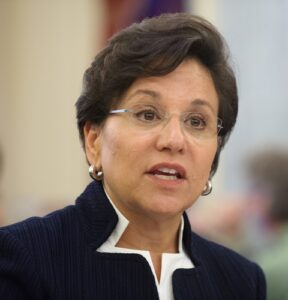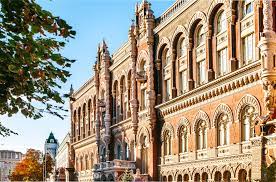
The challenges of the Ukrainian economy are related to the lack of insurance and it is already obvious that this hinders the attraction of investors, who first of all think about the protection of their capital.
This opinion was expressed by the US Special Representative for Ukraine’s Economic Recovery Penny Pritzker at the Ukraine Recovery Conference (URC2024) in Berlin on Wednesday.
“We all understand: in order for private investors to come in, insurance is needed. This is the first thing an investor thinks about,” she said.
According to Pritzker, she and her team took this as a call to action It was seconded by the US-based Development Finance Corporation (DFC) and global reinsurance broker Aon, which found practical innovative solutions to the issue. DFC already provides an insurance product designed for SMEs.
“We have purposely built an insurance model that is scalable. However, for this sector to flourish in Ukraine, many players are needed. I will encourage other insurance organizations, international institutions to think how they can join this model. I am confident: this mechanism will bring to Ukraine the necessary capital for its economic growth both when there is a war and when there is peace and reconstruction begins,” she emphasized.
According to DFC Executive Director Scott Nathan, before the war the corporation had a large portfolio in Ukraine, including risk insurance. Currently, to support the private sector and the country’s economy, one of the important toolkits in its portfolio is political risk insurance, which has closed $350 million worth of arrangements for three contracts in agriculture, manufacturing and education over the past year.
“Together with our partner ARCS, we as DFC can provide $50 million in war risk insurance, air raid risk, etc. to different clients. These can be small policies that can go to larger policies,” he noted.
At the same time, Nathan said that projects are being developed with Aon that can be scaled. One such project will be announced soon.
“Practically, we are helping local insurance companies build capacity for the country. Insurance is a mechanism to mobilize capital in the country and we hope to offer such an innovative tool. This is just the beginning, just part of our joint efforts to invest in Ukraine’s future, to lay the foundation for future investments when its recovery and reconstruction begins. It is important for the economy to work every day already now, during the war, and for this we need to build capacity in the insurance market. This is the key to success,” he said.
According to Aon President Erik Andersen, it is very important to provide protection by Ukrainian insurance companies, as well as to have a mechanism of pooled resources to provide insurance in the health care system, for small businesses, etc.,” he said.
“What we are saying is that we wanted to participate and invest our capital through the DFC, through local insurers. We have been working in Ukraine for a long time, it’s a big insurance program, and we want this capital to go to companies that operate in the country,” he said.

In a new video on its YouTube channel, Kyiv-based think tank Experts Club has presented an analysis of economic trends in the first quarter of 2024 in Ukraine and globally based on official data from the State Statistics Service of Ukraine, the NBU, the UN, the World Bank, and expert forecasts.
Macroeconomic indicators of Ukraine
According to the Center’s founder, Maksym Urakin, in the first quarter of 2024, Ukraine’s GDP grew by 4.1% to 5.3% compared to the same period last year.
“The main growth factors were an increase in agricultural exports and production activity in certain industries. However, the negative balance of foreign trade in goods in the first quarter amounted to almost $6 billion, which is 10% more than last year. This is due to an increase in energy imports after the strikes on the Ukrainian energy sector in March,” Urakin said.
According to the founder of the Experts Club, Ukraine’s national debt has reached a new historical high of $151 billion, which is almost 6 trillion hryvnia in hryvnia equivalent. Inflation in Ukraine in the first quarter was 1% year-on-year, which is in line with the NBU’s target range.
Global economy
Maksym Urakin noted that analysts forecast that the global economy will grow by 2% in 2024, which is lower than expected at the end of last year. The main reasons for the slowdown are high interest rates in developed countries and global geopolitical uncertainty.
“The US economy grew by 1.6% in the first quarter of 2024, which is lower than the growth rate observed in previous quarters, but still at an acceptable level for the development of the country’s economy. China’s economy grew by 5% due to a partial recovery from the crisis and government injections into the technology cluster,” the expert summarized.
He also reminded that the European Commission expects the eurozone economy to grow by only 0.8% in 2024, even less than 1%.
“High inflation and weak domestic demand remain the main problems of the EU countries. However, the British economy showed a modest growth of 0.6%, which indicates a weak recovery after the pandemic and Brexit,” Urakin said.
The economic situation in the world remains tense and depends on many factors, including geopolitical risks and changes in the global economic and political landscape. Experts Club will continue to monitor the situation and provide up-to-date and balanced news.
You can learn more about the macroeconomics of Ukraine and the world in the video by following the link:
Subscribe to the Experts Club channel:

The article summarizes and analyzes the main macroeconomic indicators of Ukraine. In connection with the entry into force of the Law of Ukraine “On Protection of the Interests of Business Entities during Martial Law or a State of War”, the State Statistics Service of Ukraine suspends the publication of statistical information for the period of martial law, as well as for three months after its termination. The exception is the publication of information on the consumer price index, separate information on statistical indicators for 2021 and for the period January-February 2022. The article analyzes open data from the State Statistics Service, the National Bank, and think tanks.
Maksim Urakin, PhD in Economics, founder of the Experts Club think tank, presented an analysis of macroeconomic trends in Ukraine and the world based on official data from the State Statistics Service of Ukraine, the NBU, the UN, the IMF, and the World Bank.
Macroeconomic indicators of Ukraine
Maksim Urakin cited the National Bank of Ukraine’s data on the improvement of the financial situation in 2023 compared to 2022 and the forecast for 2024.
“Optimistic forecasts for international financing, recovery of supply chains, seasonal business revival and growth in domestic demand, as well as slowing inflation, have contributed to positive expectations for economic stabilization in the near future. However, damaged energy infrastructure, rising logistics and labor costs, and a shortage of qualified personnel due to demographic factors remain constraining factors,” Urakin emphasized.
The expert noted that the risks to the economy also include a possible intensification of military operations in the summer and instability of international assistance.
“The baseline scenario for the macroeconomic situation in the country envisages further implementation of prudent monetary and fiscal policies with a focus on maintaining financial stability. Ukraine must consistently fulfill its obligations under cooperation programs with international partners, which will lead to an increase in the public debt to GDP ratio,” the economist said.
Global Economic Outlook
Maksim Urakin also analyzed the global economy, noting a slight improvement in the situation compared to the previous forecast.
“Global economic growth in 2024 may slightly exceed last year’s level, as countries such as India, China and the United States have picked up in recent months. However, the global economic recovery is still constrained by geopolitical conflicts, protectionist policies of major powers and persistent inflation,” the expert explained.
According to the expert, global GDP growth is likely to remain at 2.9% to 3.2% this year and will only slightly accelerate to 3.4% in 2025.
For Ukraine, the main challenges in the coming years will be the need to restore Ukraine after the war and manage the public debt.
Germany’s central bank expects the country’s economy to grow in April-June for the second consecutive quarter after falling at the end of 2023.
According to preliminary calculations of the statutory office of the Federal Republic of Germany, in January-March GDP increased by 0.2% compared to the previous three months. It fell 0.5% in October-December 2023.
“The economy is likely to expand slightly again in the second quarter,” the Bundesbank said in a statement on Wednesday.
Activity in the services sector was likely to have continued to strengthen on the back of rising household income and consumer spending.
“Growth in household disposable income is likely to take the upper hand from consumer uncertainty,” Central Bank analysts suggested.
However, they noted that the construction sector remains very weak.
The German labor market is expected to remain resilient and wages look set to continue to rise rapidly. This could be a risk to cooling inflation, which the Bundesbank estimates will accelerate slightly again in May.
The final data on Germany’s first-quarter GDP dynamics will be released on May 24, while preliminary information for the second quarter will be presented on July 30.
Earlier Experts Club analytical center and Maxim Urakin released a video analysis of how the GDP of the world’s countries has changed over the past years, more detailed video analysis is available here – https://youtu.be/w5fF_GYyrIc?si=BsZmIUERHSBJrO_3.
Subscribe to Experts Club YouTube channel here – https://www.youtube.com/@ExpertsClub
CENTRAL BANK, ECONOMY, EXPERTS CLUB, GDP, GERMANY, MACROECONOMICS, URAKIN

Japan’s economy contracted 0.5% in the first quarter relative to the previous three months, according to preliminary government data. Analysts, whose average estimates are quoted by Trading Economics, had expected a 0.4% decline in GDP.
According to the revised data, the economy was unchanged in the fourth quarter of 2023, while previously reported growth of 0.1%.
On an annualized basis, Japanese GDP contracted 2% last quarter after a revised zero change a quarter earlier. The consensus forecast called for a 1.5% drop in January-March.
Consumer spending in the first quarter decreased by 0.7% relative to the previous three months, business investment – by 0.8%. Government spending rose by 0.2%.
Exports decreased by 5% after growth of 2.8% quarter earlier, imports – by 3.4% (+1.8% in October-December).
Earlier Experts Club analytical center and Maxim Urakin released a video analysis of how the GDP of the world’s countries has changed in recent years, more detailed video analysis is available here – https://youtu.be/w5fF_GYyrIc?si=BsZmIUERHSBJrO_3.
Subscribe to Experts Club YouTube channel here – https://www.youtube.com/@ExpertsClub

The National Bank of Ukraine says it is implementing the largest package of easing currency restrictions for businesses since the start of the full-scale war to improve the conditions for doing business in Ukraine and the entry of domestic businesses into new markets, as well as supporting economic recovery and facilitating the inflow of new investment into the country.
“First, all currency restrictions on imports of works and services are abolished. Second, the ability of businesses to repatriate ‘new’ dividends is ensured. Third, the possibility to transfer funds abroad on leasing/renting is provided,” the NBU said in a press release on Friday evening.
“Fourth, restrictions in terms of repayment of new external loans are relaxed. Fifth, the possibility to repay interest on ‘old’ external loans is provided. Sixth, restrictions in terms of transferring foreign currency from representative offices in favor of their parent companies are relaxed,” the regulator added.
It is specified that these and a number of other technical changes were introduced by the NBU Board Resolution No. 56 of May 3, 2024 to the so-called “military” Resolution No. 18 of February 24, 2022. The vast majority of the document’s provisions come into force from May 4, 2024, and only in terms of repatriation of new dividends – from May 13, 2024.
The regulator believes that this will support Ukrainian producers and provide them with the opportunity to enter foreign markets, which in turn will contribute to a gradual increase in export revenues.
It is indicated that repatriation of dividends by businesses will be allowed only for dividends accrued based on performance after January 1, 2024.
“This relaxation does not apply to the payment of dividends at the expense of retained earnings for previous periods or reserve capital,” emphasized the National Bank.
In addition, the regulator set a monthly limit for repatriation of “new” dividends at EUR1 million equivalent in order to minimize risks to macro-financial stability. It is noted that control over compliance with this norm will be ensured thanks to the NBU’s automated information system “E-limits”.
“Providing an opportunity to repatriate “new” dividends will contribute to the inflow of new investments in Ukraine, minimize the risks of curtailing the activities of enterprises with foreign capital and support the economy,” the National Bank believes.
As for the easing of restrictions on servicing and repayment of “new” foreign loans and repayment of “old”, the NBU has reduced the minimum period of use of the loan, the funds for which come from abroad after June 20, 2023 on the accounts of residents, from three to one year, when reaching which it is allowed to buy foreign currency for its repayment. Thus, the ban on the purchase of foreign currency for repayment of “new” loans will apply to loans for up to one year.
In addition, the NBU will allow businesses, regardless of the period of use of “new” loans to buy foreign currency to pay interest on them.
“All this will contribute to increasing opportunities for Ukrainian businesses to attract new external loans not only from official partners, but also from private investors,” the release said.
Moreover, according to it, resident borrowers will be able to make transfers in foreign currency to repay interest on “old” external loans, which, according to the terms of the agreement, are payable from February 24, 2022. However, under one loan agreement for interest payments overdue as of May 1, 2024, borrowers will be able to transfer no more than 1EUR million equivalent per calendar quarter.
Also, according to the release, legal entities and individual entrepreneurs will be able to transfer funds abroad for settlements under leasing or rental contracts without additional restrictions on the subject of such a contract, as well as the date of its conclusion.
The National Bank reminded that previously such permission was only for leasing or renting vehicles.
Regarding the permission for representative offices of foreign companies to transfer foreign currency to the accounts of parent companies, it is specified that the central bank will allow international card payment systems and foreign airlines to buy and transfer foreign currency abroad to the account of a non-resident legal entity, but for such operations will be set a monthly limit of EUR5 million in equivalent.
According to the regulator, this will contribute to further development of cashless settlements in Ukraine.
ACTIVITIES, BUSINESS, CURRENCY, ECONOMY, INVESTMENTS, NATIONAL BANK OF UKRAINE, UKRAINE